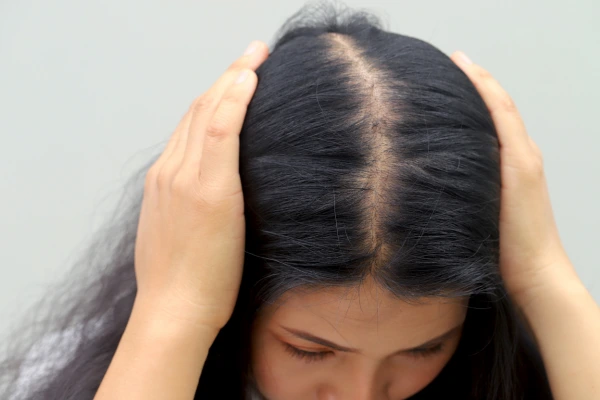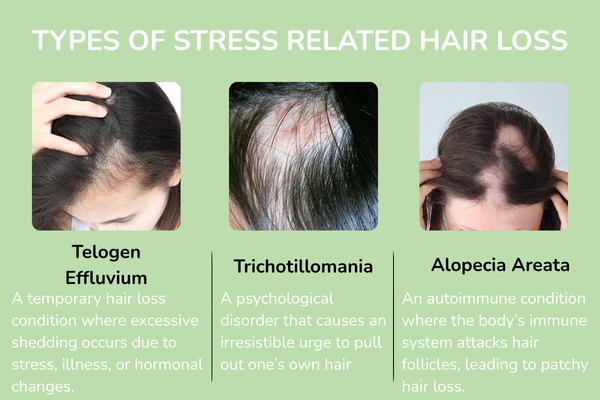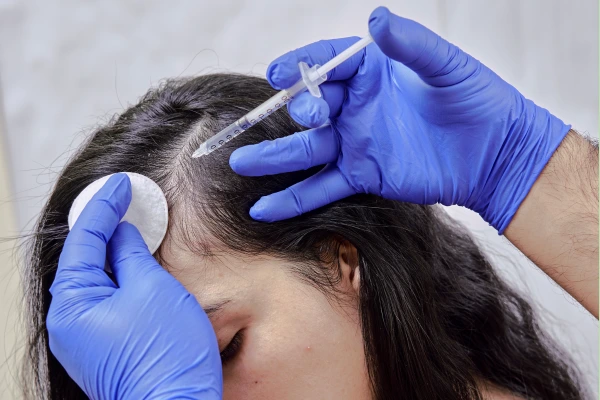Up to 25% OFF on Selected Treatments
-
Treatments
Acne and Scar
Pigmentation
Laser Hair Reduction
Dermato-surgery
Body
Anti Aging
Skin Rejuvenation
Others
- Clinics
- Blogs
Treatments
One morning, you run your fingers through your hair and notice more strands than usual catching between your nails. You will end up with a number of questions. If you are asking, “Can stress cause hair loss?” then the answer is YES. Our mind and body are deeply connected, and stress affects both profoundly. It’s not just an emotional burden; stress also disrupts the body physiologically, including the natural hair growth cycle. Prolonged anxiety can trigger persistent hair shedding and thinning. From sleepless nights to hormonal imbalances, stress has a way of revealing itself, and one of the most visible signs is hair loss.
In fact, stress-induced hair loss is one of the most common yet overlooked conditions dermatologists see today. Whether it is chronic work pressure, emotional strain, or sudden life changes, stress can disrupt the natural growth cycle of your hair, leading to noticeable thinning or excessive shedding.
But how exactly does such damage happen? And more importantly, can hair grow back after stress? How do stress and anxiety cause hair loss? To understand all your questions, let’s know the science behind how stress and anxiety cause hair loss, what symptoms to look out for, and the most effective treatments for hair loss due to stress, both natural and medical, to help you regain healthy, fuller hair.
Hair grows in three distinct phases:
Excessive stress can disrupt this cycle, pushing more hairs prematurely into the telogen phase. This results in visible shedding a few months after the stressful event, a condition known as telogen effluvium.

Women are often more susceptible to noticing hair thinning due to stress. Hormonal fluctuations combined with chronic stress can amplify shedding, making female hair loss from stress more noticeable.
Because hair is socially and emotionally meaningful, the psychological burden of “Why is my hair falling out after stress?” is much heavier, and that itself can exacerbate stress.
If you are experiencing:
These are some common stress hair loss symptoms pointing toward telogen effluvium.
Caution: Not all hair loss is stress. Consider:
If you see sudden patches or bald spots, or if shedding continues beyond 4–5 months, it’s time to seek medical help.

Triggered by stress, hormonal imbalance, illness, or nutritional deficiencies, telogen effluvium forces hair into the resting phase, causing diffuse shedding. It usually occurs 2–3 months after the stress event and is often reversible.
Common triggers include:
This is a psychological condition where stress leads to compulsive hair-pulling. It can cause bald patches and often coexists with anxiety or other mental health disorders.
Stress can sometimes trigger autoimmune reactions where the immune system attacks hair follicles, causing patchy baldness.
Understanding the type of stress hair loss you have helps determine whether natural remedies or medical interventions are most effective.
In most cases, hair can and will grow back once stress is managed. For Telogen Effluvium, shedding usually stabilizes within 3–6 months, and full regrowth occurs in 9–12 months.
However, regrowth depends on
Combining lifestyle adjustments with stress management techniques can hasten recovery:
These strategies help stop hair loss from stress naturally while supporting hair regrowth.
For persistent or severe hair loss, dermatological treatments can help recover hair loss from stress efficiently:
Minoxidil is a USFDA-approved topical medication that helps stimulate hair follicles, improve blood circulation, and extend the hair growth phase. It’s suitable for both men and women experiencing stress-related or hormonal hair loss.
Peptide serums are formulated with biomimetic peptides that nourish the scalp, strengthen hair roots, and support healthy hair growth. They work by stimulating collagen and keratin production, improving scalp health, and reducing hair fall. When used consistently, peptide serums can enhance hair density and complement Minoxidil results effectively.
PRP therapy uses your own blood plasma, rich in growth factors and platelets, to naturally rejuvenate hair follicles. The dermatologist extracts a small amount of your blood, processes it in a centrifuge, and injects the plasma into areas of hair thinning. This stimulates dormant follicles, boosts nutrient delivery, and encourages new hair growth. It’s a safe, minimally invasive procedure that shows noticeable results within a few sessions.

GFC is an advanced version of PRP treatment. Instead of using whole plasma, it isolates only the purest and most potent growth factors responsible for cell repair and follicle stimulation. This makes it more concentrated, stable, and effective in promoting thicker and healthier hair regrowth. It’s ideal for those dealing with stress-related hair loss, alopecia, or diffuse thinning.
Medical treatments help restore hair, but prevention is equally important:
Early recognition and holistic care ensure that hair loss does not become permanent.
If you’ve noticed hair shedding continuing for more than 4–5 months, visible scalp patches, or worsening thinning despite lifestyle adjustments, consult a dermatologist specializing in hair loss. Early intervention prevents further follicle damage and allows targeted treatments like PRP, GFC, or minoxidil to deliver faster results.
Yes, stress can cause hair loss, and yes, you can recover from it. Too many people resign themselves to thinning or worry forever. But when you combine expert diagnosis, medical treatments, and life-level changes, the path to fuller, stronger hair is real.
If you’ve been Googling “hair loss from stress remedy,” “treatment for stress related hair loss,” or “recover hair loss from stress,” you don’t have to wait. At Evenly Clinic, our dermatologists specialize in identifying your unique triggers and designing a custom recovery plan, from gentle interventions to high-end treatments.


Evenly Skin and Hair Clinic – HSR Layout
Third Floor, 815, 27th Main Rd, above Bluestone, 1st Sector, HSR Layout, Bengaluru, Karnataka 560102
Evenly Skin and Hair Clinic – Jayanagar
35, Ground Floor, Vinyas Arcade, 11th Main Rd, Vishya Bank Colony, 5th Block, Jayanagar, Bengaluru, Karnataka 560041
Evenly Skin and Hair Clinic – Indira Nagar
1st Floor, 134, Above Namdhari’s Fresh, 1st Main Rd, 2nd Stage, Domlur, Indiranagar, Bengaluru, Karnataka 560071
For health-related information, follow us on Instagram!!
Can stress really cause hair loss?
Yes. Chronic or sudden stress can push a large number of hair follicles into the resting (telogen) phase, causing increased shedding. This condition is known as telogen effluvium and is one of the most common forms of stress-induced hair loss.
Can hair grow back after stress hair loss?
Yes, hair can grow back after stress once the underlying cause is treated. Dermatologist consultation and their treatment options, like PRP or GFC treatment, may help accelerate regrowth and improve hair thickness.
How do I know if my hair loss is due to stress or another reason?
If you notice diffuse hair thinning or increased hair fall on your pillow, shower drain, or brush without clear bald patches, it is likely stress-related. However, patchy or patterned baldness could indicate other conditions like alopecia areata or androgenetic alopecia, requiring a dermatologist’s evaluation.
How long after stress does hair fall occur?
Hair loss from stress generally appears 2–3 months after a major stressful event. This delay happens because hair follicles take time to transition into the shedding phase after the stress trigger.
Can anxiety cause hair loss too?
Yes, anxiety and chronic stress both increase cortisol levels, which can disrupt the normal hair growth cycle. Over time, this can result in diffuse thinning and hair shedding similar to telogen effluvium.
Does hair loss from stress affect men and women differently?
Yes. Female hair loss from stress is often more diffuse across the scalp, while men might notice thinning along the crown or hairline. Hormonal imbalances can further intensify the shedding in women.
We hope this information is helpful. If you have any skin and hair-related questions or would like to discuss personalized solutions, please reach out to us at 7337899030. Our team of specialists is committed to delivering personalized care tailored to your specific needs. Take the first step towards a healthier, more confident you by scheduling a consultation with us today. Your journey to vibrant skin and stronger hair begins here.
Book an Appointment
Start your journey to healthy skin and hair today.
Leave a Comment